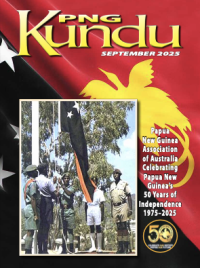Beginnings and endings: Mark Lynch
After three weeks’ travel through one of the last ‘restricted’ areas of the New Guinea, our patrol reaches yet another remote mountain valley.
Warriors on the ridge above our chosen campsite shake their weapons, shouting and gesturing threateningly. Through several languages and interpreters, a polite translation is ‘Go away. This is our land’. We shout back: ‘We’ll camp down here. Bring food; we have shells, salt, good things to trade.’
Making camp for two patrol officers, 10 police, five interpreters, 40 carriers, a medical orderly and a cook is a well-oiled routine. Canvas erected over stores and sleeping areas protect from inevitable late-afternoon rains. Rope tied on rough posts, encircles the camp, marking how close visitors can approach.
Most of the valley stay away. A small group approaches—men armed and wary—bows and arrows in hand, stone clubs tucked into belts under their beaten bark cloaks. Women carry string bags of sweet potato and greens, suspended from their heads and hanging down their backs.
Under watchful eyes of the armed police, we trade shells, salt, beads, grease-paper-wrapped razor blades and small knives for fresh vegetables.
With care, diplomacy, and using sign language, the medical orderly assesses our visitors’ health. Many have yaws: a disease causing flesh ulcers that grow, deepen and debilitate. The sufferers accept injections of penicillin, exhausting our supply. We learn more people, never before visited, are another day’s walk south.
I radio for an airdrop of penicillin and supplies. We clear a drop zone across the creek, and ready a signal fire. After two days, the pilot finds us. There is great excitement when the little Cessna, door removed, engine roaring, makes several low runs, dropping carefully packed supplies into the clearing, before banking and disappearing over the mountains.
We split the patrol. I take a small party to contact the southern group, travelling light and fast, leaving the main group to build some bush huts as a future base camp.
The southern villagers, very surprised to see us, watch us make camp not far from their houses. They appear self-confident in their own surroundings but curious. I’m impressed their clothing, weapons, tools, houses, food and medicines all come from their own knowledge and skills: total self-sustainability, even if infant mortality is high and life expectancy low, probably around 40 years. Several women wear necklaces dangling the dried fingers of dead children. One wears a pair of tiny smoked hands, remembrance of heart-felt loss, like our mothers cherish a locket of hair or photograph.
For a day, we learn from each other. Penicillin is used for more yaws and a woman’s infected leg.
We re-join the patrol. People are waiting on the track: yaws sufferers, who saw how in six days the ulcers of those previously injected were drying out, scabbing over, beginning to heal. More penicillin is administered. One heavily pregnant young woman has a large ulcer forcing up and distorting her inner upper lip. Eating must be excruciating.
Tomorrow is the beginning of the end of our patrol. We’ll head home to the Patrol Post, one weeks walk away. For the people we have located, it is the beginning of their contact with an outside world and, for better or worse, the ending, forever, of their total isolation and self-sufficiency. They, and we, will remember this time.


